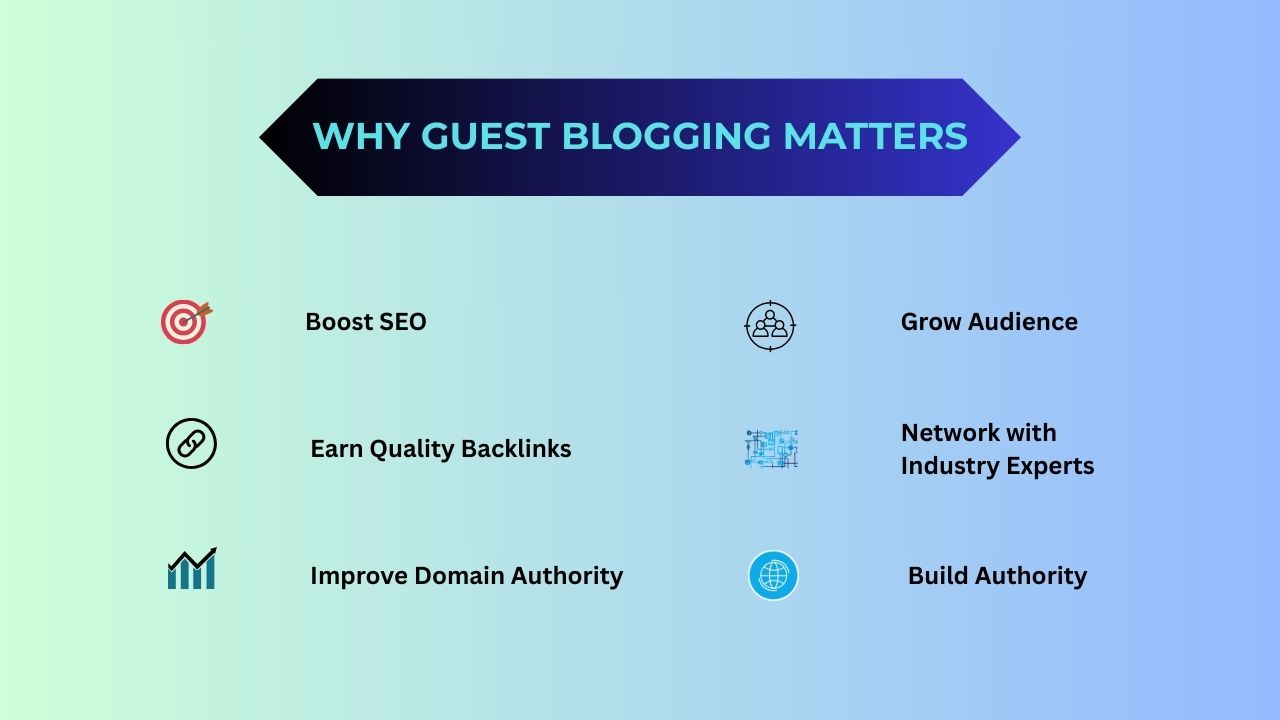What is Guest Blogging - Benefits, Opportunities & Promotions
Table of Contents
ToggleEver wondered how some brands seem to pop up everywhere online?
One of their secret weapons is guest blogging. But what is guest blogging, really?
What is Guest Blogging?
It’s the process of writing content for someone else’s blog – usually in your industry – in exchange for exposure, credibility, and juicy guest post backlinks.
The result?
A win-win: they get great content, and you get visibility.
In today’s content-hungry world, guest blog writing isn’t just a growth hack – it’s a smart, sustainable strategy. It helps you rank higher on Google, build authority, and connect with new readers.


More than that, it opens doors. Whether you’re a freelancer, a startup, or running a brand, guest blogging helps you get noticed in the right circles. From building relationships to boosting your SEO, the benefits are too good to ignore.
Let’s break down the real guest blogging benefits and how to tap into the right opportunities next.
Why Guest Blogging Matters: Key Benefits
Guest blogging offers much more than visibility – it drives real results for brands aiming to grow online. Here’s how tapping into guest blogging opportunities can make a measurable impact:


- Boost search engine rankings
SEO guest blogging plays a big role in improving search visibility. When top blogs link to your site, search engines view your content as credible. These high-quality guest post backlinks boost your authority and improve your rankings.
- Earn strong backlinks
Publishing guest posts on niche-relevant sites earns links that matter. Backlinks from trusted blogs pass SEO value to your site and help build a healthy link profile. These links also attract organic traffic over time.
- Grow your domain authority
Guest blogging on established sites helps strengthen your domain authority. Google recognizes these signals and rewards sites that appear reputable and well-connected.
- Drive relevant traffic
A well-placed guest post directs niche readers to your site. Since they’re already interested in the topic, these visitors are more likely to stick around, explore, and convert.
- Increase brand visibility
When your content shows up on the blogs your audience already follows, it naturally puts your brand on their radar. Guest blogging lets you tap into trusted platforms and stay top-of-mind with the right crowd.
- Showcase your expertise
Writing in-depth, insightful content helps you build credibility. It allows you to demonstrate thought leadership and attract interest from readers, peers, and potential partners.
- Open new networking doors
Every guest post builds a new connection—with editors, marketers, or other writers. These relationships can lead to future collaborations and even business referrals.
Done right, guest blogging strengthens your online presence across SEO, traffic, authority, and relationships.
Let’s explore how to prepare for success in the next step.
Requirements for Successful Guest Blogging
Before you jump into guest blogging, a few basics need to be in place. First up, strong writing skills. You don’t need to be the next Hemingway, but your guest post writing should be clear, valuable, and easy to follow.
If your content solves a problem or shares something insightful, you’re on the right track.
Next, be smart about choosing your host blogs. Don’t shoot in the dark.
Find guest posting website lists or do your own research to target blogs that match your niche, have good domain authority, and share quality content.
Also, get clear on your goals. Are you after SEO guest blogging benefits like backlinks and authority?
Or do you want visibility with a new audience?
Either way, knowing your “why” before pitching helps you craft better content – and land better guest blogging opportunities in the long run.
Identifying Guest Blogging Opportunities
So, how do you find the right places to submit your guest post?
It starts with strategic research. Don’t just shoot emails to every blog you come across. Look for websites that actively accept guest blogging submissions and have audiences that match your niche.
Start with a simple Google search using terms like “write for us” + your niche, guest blogging opportunities, or free guest blogging website. This can help you find a solid list of potential sites.
You can also check out existing guest post backlinks on your competitors’ sites using SEO tools like Ahrefs or SEMrush. This shows you where they’ve written guest posts – and where you might have a shot too.
Next, check if the site has clear guest post guidelines. Most legit blogs will outline exactly what they’re looking for, from tone to formatting. If the blog doesn’t link back to your site or lacks authority, it might not be worth the effort.


Here’s a smart tip: focus on blogs that haven’t linked to you before. New, quality backlinks can help boost your domain authority and SEO rankings.
Finally, always check the site’s content quality and posting frequency. A blog that’s active, ranks well, and engages with its readers is the kind of guest posting website you want to write for.
Guest blog writing isn’t just about getting published. It’s about choosing platforms that amplify your voice and drive real results.
Crafting Compelling Guest Post Ideas
Coming up with winning guest post ideas starts with one rule – relevance is everything. The best guest blog writing always speaks directly to the audience of the host site.
That means no generic topics or surface-level advice. Spend time understanding the blog’s tone, format, and most popular content.
Start by diving deep into the blog you want to pitch to. Read their top posts. Check what’s trending. Find the gaps—topics they haven’t covered yet or ones you can update with a fresh spin.
This is where strategic keyword research steps in. Use tools like Ubersuggest or Google Keyword Planner to find SEO guest blogging topics your audience is already searching for.
Once you’ve done your research, brainstorm at least 3–5 ideas tailored to that blog. Prioritize originality and audience intent.
Make sure each idea naturally fits within your niche and supports your own content goals too.
Then comes the headline game. Your titles need to grab attention, spark curiosity, and promise value. Avoid clickbait – but don’t be boring either.
Think: “The Ultimate Guide to Guest Post Writing for SaaS Startups” or “Why Guest Post Backlinks Are Still SEO Gold in 2025.”
A compelling idea makes your pitch easier to accept – and the writing more fun to do. Remember, guest blogging isn’t about stuffing in backlinks.
It’s about creating something valuable that feels like it belongs on the host blog.
Great content gets picked. Strategic content gets shared.
Reaching Out to Blog Owners
So, you’ve got a killer idea – now it’s time to pitch it. This part makes or breaks your guest blogging efforts. A well-written guest post won’t matter if your pitch flops.
Start by finding the right contact. Avoid sending your pitch to general emails like info@.
Instead, look for a content editor or blog manager. A bit of LinkedIn or site digging usually does the trick.
Your email should be personal, short, and value-driven. Mention a specific post you liked from their blog to show you’ve done your research.
Then, clearly explain your guest post idea and how it benefits their readers not just your brand.


Skip fluff. Be direct. Something like:
“I’d love to contribute a guest post titled ‘5 Little-Known SEO Guest Blogging Hacks for B2B Brands’. It’s designed to offer unique insights your audience will find valuable.”
Link to your previous guest post writing samples. Make sure they reflect quality and relevance. This builds trust fast.
Finally, respect their guest post guidelines. If they have a process, follow it. If they say “no link stuffing,” don’t stuff links.
Remember, guest blogging opportunities grow when you’re easy to work with.
Treat pitching like a conversation—not a cold call.
Creating a Guest Post That Shines
You’ve landed the opportunity – now let’s make it count. Your guest blog writing needs to impress not just the host, but their readers too.
Start by following the guest post guidelines. Every blog has its preferences—tone, word count, formatting, and link policy.
Ignoring them? Big red flag.
Next, write content that’s high-value and genuinely helpful. Your guest post shouldn’t sound like a sales pitch.
Instead, focus on solving a problem, offering fresh insights, or sharing a unique perspective.
Use SEO best practices naturally, think keyword placement, clean subheadings, and internal linking if allowed. This is what makes SEO guest blogging actually work.
Structure matters too. Start with a hook, break content into sections, and close with a clear takeaway. Make it skimmable. No one wants to read a wall of text.
Add value beyond the post. Include credible sources, visuals if permitted, or actionable tips. That’s how your guest blog writing becomes memorable.
Lastly, keep self-promotion tasteful. One link in your author bio (if allowed) is enough. Focus on building trust, not just backlinks.
A strong post opens doors to future guest blogging opportunities and builds your name in the space.
Your goal? Write something so good, they want you back.
After Publication: Promotion and Engagement
Once your guest post goes live, don’t ghost it. Share it across your social platforms, tag the host blog, and thank them publicly.
Engage with reader comments as this builds your authority. Active participation keeps your guest blogging efforts alive and may lead to more guest blogging opportunities down the road.
The Power of Strategic Guest Blogging
Guest blogging isn’t just about backlinks as it’s about visibility, credibility, and connection. A smart guest post strategy builds your brand voice, improves SEO, and expands your reach. Whether you’re new or seasoned, consistent guest post writing can transform your content game. Start pitching, keep creating, and grow your digital footprint.
